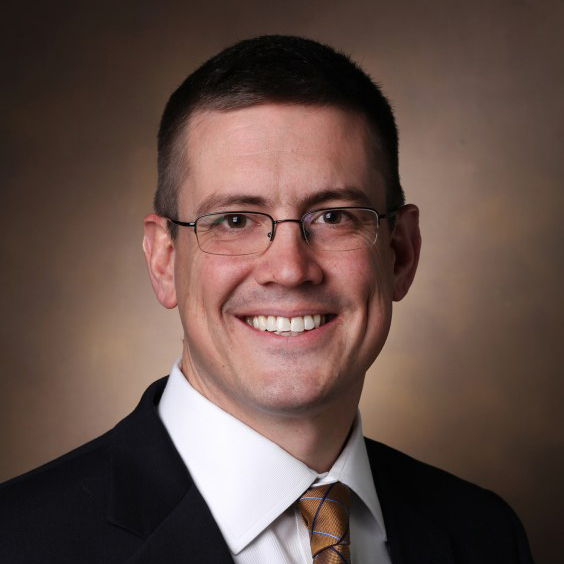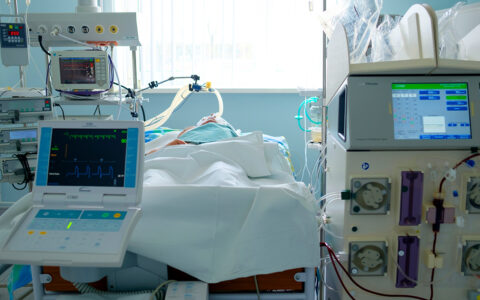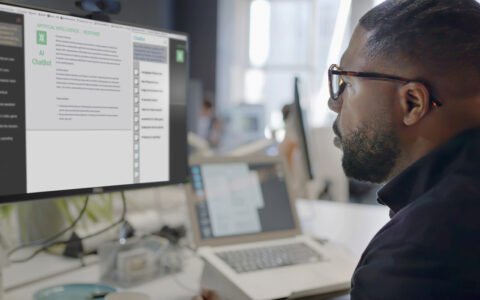Physicians attend scores of conferences during their careers, and in that stimulating environment they make notes, snap photos, examine slides, and ponder practice changes.
However, a lot of the material from this work gets forgotten when physicians return to work and a packed schedule of clinic duties, EHR time and other responsibilities. Too often this means that “urgent” trumps “important.”
To address this gap, a cross-departmental Vanderbilt initiative is applying knowledge of neurology to improve continuing education of physicians.
Matthew McEvoy, M.D., vice chair of perioperative medicine in the Department of Anesthesiology, works with a team to teach best practices – in small chunks, on mobile devices, spaced over time, with questions and the expectation of immediate feedback on answers.
“This can be thought of as workplace-based micro-learning.”
“This can be thought of as workplace-based micro-learning,” McEvoy said. “Research has shown that the passive learning models that we typically use, delivered outside the daily practice, don’t work well.”
The consequences include an almost unconscionable delay in applying solid research evidence to clinical practice, McEvoy said.
“Sometimes there are logical reasons for that, but in many cases there aren’t. On the whole, this publication-to-application gap is too wide,” he said. “As a result, emerging evidence on medical breakthroughs or best practices tends not to be shared and implemented effectively.”
Early Testing
Working and learning have been considered separate domains for far too long, McEvoy said. By baking education into the workday, physicians find it easier to align their work with the evidence.
“Unlike traditional continuing education, the microlearning method uses an active-learning approach, where physicians engage by providing an answer to a question,” McEvoy said.
QuizTime, a Vanderbilt-developed web-based micro-learning platform, was put to the test to see if it changed behaviors. McEvoy and his colleagues created modules around two large studies, Isotonic Solutions and Major Adverse Renal Events Trial (SMART), and Saline against Lactated Ringer’s or Plasma-Lyte in the Emergency Department (SALT-ED) that he says should be influencing the ordering of intravenous (IV) fluids.
“We found that it did change ordering behavior, which is more than can be said of most traditional learning approaches,” he said. “But after a while, the clinicians tended to return to their original patterns.”
This has been mirrored in their other module testing.
“We chose things out of the gate that have well-established data on them, like the IV fluids and avoiding hypothermia during surgery, and yet we still didn’t see the long-term uptake into routine clinical care the way that it should be,” he said. “This points to the need to refine the system so the learning is ‘stickier’.”
Making Learning Stick
A good place to start is determining the correct dosage for education.
“How many questions do we ask? What’s the optimal approach for learner engagement? What is the right frequency?” McEvoy asked. “If we are to change everyone’s behavior, but the effect starts declining after about eight weeks, what do we need to do to better bake that into routine care?”
McEvoy says it may be necessary to redefine “practice-based learning improvement,” a core competency in resident training.
“My colleague Bill Stead [William W. Stead, M.D.,] suggests that the term should be flipped to ‘learning-based practice improvement,’ to change the emphasis,” he said. “Yes, there are things that we do in practice that prompt us to go learn more, but we should also have learning driven to us that then changes our practice.”
Metrics, Improvements and Dissemination
QuizTime outreach is funded in part by the State of Tennessee, enabling statewide dissemination of 53 different modules that each include 10 to 20 multiple choice questions. For numerous specialties, module content may focus on emergent concerns, like COVID-19 news or the measles outbreak of 2022. Or, it may address ongoing concerns, such as opioid prescribing.
Online learning expert Kim Garvey, Ph.D., and educational development specialist Leslie Fowler, Ed.D., work along with perioperative leader Miklos D. Kertai, M.D. and ASPIRE metrics expert, Patrick Henson, D.O., on these modules and the broader initiative. All are part of the Department of Anesthesiology at Vanderbilt.
QuizTime provides continuing education credit to users who are not affiliated with Vanderbilt, as well as in-house staff. In opioid education alone, the program has engaged more than 6,000 medical professionals across Tennessee and into Mississippi and South Carolina, McEvoy said.
Using MPOG ASPIRE metrics that are anesthesia-specific, the researchers are currently monitoring QuizTime quality outcomes, and seeing a trend toward longitudinal improvements in care performance and associated better patient outcomes.
“We have gone from four metrics, originally, to 26 total today. Our goal as we continue to get this feedback is to refine our modules and distribute them to 350 people in our department – faculty, residents, nurses and CRNAs. Then we would be able to share it with with any anaesthesia department across the country,” McEvoy said.




